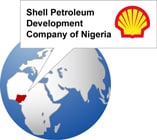 |
Shell Petroleum Development Company of Nigeria (SPDC) produces 43% of Nigeria’s oil and is the pioneer and leader of Nigeria’s petroleum industry. Operating in the Niger Delta and adjoining shallow offshore areas, Shell has over 3,000 kilometers of pipelines, 87 flowstations, 8 gas plants and more than 1,000 wells. |
The Challenge
Shell Petroleum Development Company of Nigeria (SPDC) monitors and controls its upstream production process from over 1,000 wells via DCS’s, Fisher ROC RTUs, and Modbus based PLCs. Shell Petroleum Development Company of Nigeria (SPDC) collects field data in a central location by linking to their DCS’s, RTUs and PLCs via satellite and radio.
Initially, a UNIX-based system facilitated the RTU and PLC data collection process by using various custom interfaces to communicate with the remote RTUs and PLCs.
This legacy system soon outlived its usefulness. Limitations included difficulty in producing reports, a restricted number of concurrent users and bugs in the software. As well, the system did not use a standards-based communication infrastructure, so the number and type of applications available to access, report on, and trend the process data were limited. Besides, the system was not user friendly and very difficult to maintain and configure. It also did not allow for remote device configuration.
For SPDC to continue using their UNIX system, they would require custom interfaces. SPDC then demanded a more robust infrastructure that would
give them the required scalability and flexibility to improve their process management
Custom interface development was expensive and time consuming, not to mention that SPDC would then be “locked” into their existing vendor, thereby constraining their busin